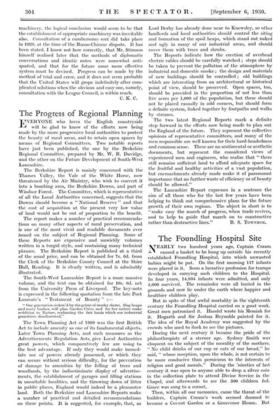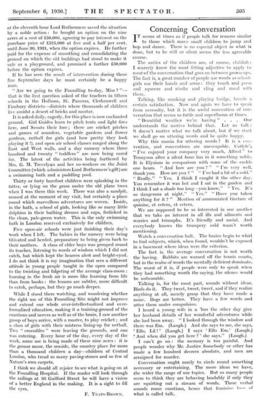The Foundling Hospital Site
NEARLY two hundred years ago, Captain Coram caused a basket to be hung up outside his recently established Foundling Hospital, into which unwanted babies might be put. On the first morning 117 infants were placed in it. Soon a lucrative profession for tramps developed in carrying such children to the Hospital. In four years, 14,934 infants were admitted, and only 4,000 survived. The remainder were all buried in the grounds and now lie under the earth where happier and healthier children play.
But in spite of that awful mortality in the 'eighteenth century the Foundling Hospital carried on a good work. Great men patronized it. Handel wrote his Messiah for it. Hogarth and Sir Joshua Reynolds painted for it. The idea of the Royal Academy was suggested by the crowds who used to flock to see the pictures.
During the next century it became the pride of the philanthropists of a sterner age. Sydney Smith was eloquent on the subject of the morality of the mothers. "No child drinks of our cup or eats of our bread," he said, "whose reception, upon the whole, is not certain to be more conducive than pernicious to the interests of religion and good morals." During the 'nineties of last century it was open to anyone able to drop a silver coin in the collection plate to attend Divine Service in the Chapel, and afterwards to see the 500 children fed. Grace was sung to a cornet.
Then, within all our memories, came the threat of the builders. Captain Corarn's work seemed doomed to become a Covent Garden or a Grosvenor House. But at the eleventh hour Lord Rothermere saved the situation by a noble action : he bought an option on the nine acres at a cost of £50,000, agreeing to pay interest on the purchase price of £525,000 at five and a half per cent. until June 30, 1931, when the option expires. He further paid for the expense of smoothing and consolidating the ground on which the old buildings had stood to make it safe as a playground, and promised a further 150,000 before the option expires.
If he has seen the result of intervention during these fine September days he must certainly be a happy man.
"Are we going to the Foundling to-day, Miss ? "- that is the first question asked of the teachers in fifteen schools in the Holborn, St. Pancras, Clerkenwell and Finsbury districts—districts where thousands of children live amidst a desert of bricks and mortar.
It is asked daily, eagerly, for this place is now enchanted ground. Girl Guides learn to pitch tents and light fires here, and Scouts their lore ; there arc cricket pitches and games of rounders, vegetable gardens and flower gardens, netball for girls (and how pretty they look playing it !), and open air school classes ranged along the East and West walls, and a day nursery where three hundred and twenty " toddlers " are now being cared for. The latest of the activities being furthered by Mrs. G. M. Trcvelyan and her co-workers on the Joint Committee (which administers Lord Rothermere's gift) are a swimming bath and a paddling pool.
Thirty or forty barefoot children were splashing in the latter, or lying on the grass under the old plane trees when I was there this week. There was also a sandpit, unused at the moment of my visit, but certainly a place round which marvellous adventures are woven. Inside, in the bath, a school of girls, looking like so many little dolphins in their bathing_ dresses and caps, frolicked in the clean, pale-green water. This is the only swimming bath in London reserved exclusively for children.
Five open-air schools were just finishing their day's Ivork when [left. The babies in the nursery were being titivated and herded, preparatory to being given back to their mothers. A class of elder boys was grouped round its teacher, listening to words of wisdom which I did not catch, but which kept the hearers alert and bright-eyed. I do not think it is my imagination that sees a different attitude in young people taught in the open compared to the twisting and fidgeting of the average class-room : learning in the fresh air is more like learning from life than from books : the lessons are subtler, more difficult to catch, perhaps, but they go much deeper.
While I stood there watching, and wondering whether the right use of this Foundling Site might not improve and extend our whole over-intellectualized and over- formalized education, making it a training-ground of the emotions and nerves as well as of the brain, I saw another group of boys arrive, with a master, to play cricket ; and a class of girls with their mistress lining-up for netball. Two " crocodiles " were leaving the grounds, and one was entering. Every hour of the day, every day of the week, some use is being made of these nine acres : it is the grouse moor, the seaside, the country place for more than a thousand children a day—children of Central London, who tread so many paving-stones and so few of Nature's own carpets.
I think we should all rejoice to see what is going on at the Foundling Hospital. If the reader will look through the railings at 93 Guilford Street he will have a vision of a better England in the making. It is a sight to fill the eyes.
F. YEATS-BROWN.































 Previous page
Previous page